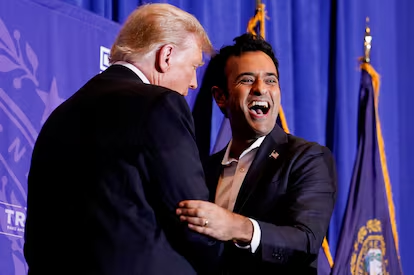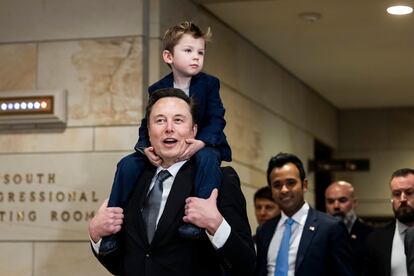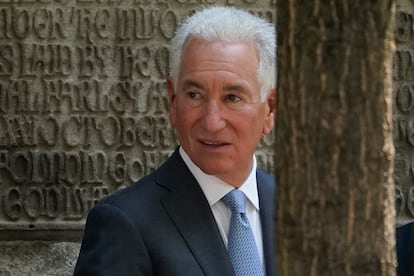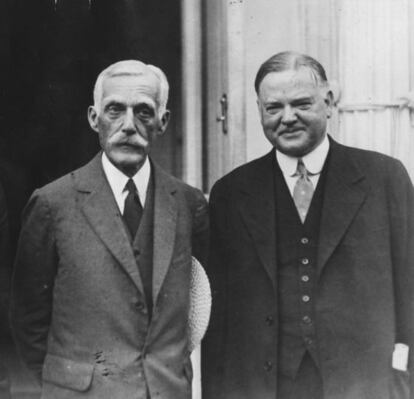Donald Trump’s government of billionaires
The president-elect’s nominations to his incoming administration include at least a dozen super-rich individuals. The question is how these appointments fit in with the campaign promise to rescue the working class


Among the many records that Donald Trump is breaking these weeks as he puts together his new administration, there is one that is very likely to remain unchallenged in the near future: having the Cabinet with the most billionaires. There is, of course, Elon Musk, his new best friend and the richest man on the planet, who last week became the first person whose fortune exceeds $400 billion. But among the appointments of the president-elect, there are also at least a dozen super-wealthy people like himself (and a few more who are just plain rich). In addition to having loads of money, they have something else in common: an unshakeable loyalty to the leader, whose first term in office had already included some (though much fewer) potentates.
Musk is joined in the billionaires’ club by Vivek Ramaswamy, his sidekick at the Department of Government Efficiency (DOGE), a newly created advisory group that is not exactly part of the executive branch and has been tasked with cutting government spending. Ramaswamy’s biotechnology businesses have earned him a wealth of around $1 billion (according to public records, as every other individual listed in this article). His anti-woke ideas and his image as a millennial libertarian catapulted him to fame in the MAGA world in 2023. He was a candidate in the Republican primaries, but fell in the early rounds and became a staunch Trump supporter.

Doug Burgum, the governor of North Dakota until two days ago and whose fortune exceeds $1.1 billion, also ran in the primaries and also threw in the towel early. If the Senate approves his nomination, he will take over the Interior Department, becoming one of the four secretaries who belong to the league of billionaires. The others are Linda McMahon (Education), who made her money (about $2.6 billion) thanks to American professional wrestling, the banker Howard Lutnick (Commerce; about $2 billion); and Scott Bessent (Treasury), whose exact wealth has not been determined although no one doubts that it exceeds $1 billion. There is also an undersecretary, Stephen Feinberg (Defense), with $5 billion in assets, and a secretary, Chris Wright (Energy), who is outside the billionaires’ club but still commands a fortune estimated at $171 million.
When Trump threatened during his campaign to turn almost everything upside down in terms of foreign policy, it was not easy to know that he was also referring to establishing something like a plutodiplomacy, with appointees such as the banker Warren Stephens ($3.3 billion), who is being made ambassador to the United Kingdom, or the investor Steven Witkoff (special envoy to the Middle East; more than $500 million). Nor did the candidate mention that he was intending to break with decorum by tapping relatives for administration roles: Massad Boulos, the father-in-law of his youngest daughter Tiffany, as adviser on Middle East issues; and his son-in-law Jared Kushner’s father, Charles, as ambassador to Paris ($2.9 billion).

The list of the wealthy in Trump’s entourage (his own fortune was estimated this week at $5.4 billion) is completed by the amateur astronaut Jared Isaacman (who has strong ties to Musk, will head NASA, and has a fortune of about $1.9 billion); the CEO of the financial company Fiserv, Frank Bisignano (tapped to be the Social Security commissioner, more than $900 million); the physician and TV host Mehmet Oz (in charge of public health services; at least $100 million); the businesswoman Kelly Loeffler (nominated to head the Small Business Administration; $1.1 billion); and the tech investor David Sacks (AI and crypto czar; $200 million). Although the list could go on, depending on where one draws the line (or rather, the velvet rope) to join this exclusive club. Vice President-elect J. D. Vance, for instance, has a fortune estimated by CBS at between $4.8 million and $11.3 million.
The role of the working class
The question now is how these appointments fit in with a campaign that Trump based largely, and with proven success, on his promises to come to the rescue of the working class. Among the faithful who attended his rallies, there was a widely held belief that the wealth of the presidential candidate and of those with whom he planned to surround himself were a guarantee that they would govern cleanly. “These people do not need politics to get rich; we can be sure that there will be no corruption,” explained a voter outside a Vance rally in Arizona shortly before the election. Another idea was also widespread, summed up by a young supporter from North Carolina, DeAndre Jones: “If these people run the country as successfully as their companies, we are saved.”
“As a super-rich celebrity himself, Trump both identifies with and likes to surround himself with his own kind”, historian Michael Kazin, a professor at Georgetown University and an expert on American labor, said by email. “Most of his working-class vote was a result of his perceived authenticity as someone who speaks his mind, his performative “toughness,” and, of course, his promise to stop illegal immigration and stem inflation. And most Americans have never disliked the rich for just being rich ― but those who they think are exploiting or cheating them as workers and consumers. Trump has managed to avoid being seen that way”. Kazin hopes, however, that those voters will soon wake up to the irony of the president having appointed this parade of billionaires with the task, in some cases, of cutting public services that benefit the most vulnerable.
In Musk’s case, Chuck Collins has another theory. An heir to the Oscar Mayer meat processing empire who renounced his inheritance to become an academic expert on inequality, Collins is the author of The Wealth Hoarders: How Billionaires Spend Millions to Hide Trillions, an essay exposing the tricks used by American billionaires to avoid taxes, sequester political power and disguise as philanthropy what is often nothing more than another way of perpetuating their power. In an email, he said that he believes Musk has reached that point where “a business leader diverts attention from his business to defend his money, frustrate competition and participate in the exercise of political influence, through contributions to campaigns [he donated more than $260 million to Trump’s campaign], securing ownership of the media [he owns the social network X] and supporting political think tanks.” Normally, Collins explains, that phase comes with “the second or third generation of dynastically wealthy families.” “But Musk is, given his extraordinary wealth and ambition, unusual in that regard as well,” he adds.

To find precedents for what is happening with the Trump 2.0 administration, this expert recommends going back to the 1920s, at the end of what is known as the Gilded Age. At that time, the financier Andrew Mellon headed the Treasury Department, a position from which he promoted the interests of the “robber barons,” a pejorative term used for the businessmen who forged America’s industrial power and enriched themselves through monopolistic practices. That did not turn out well, and today it is considered one of the most corrupt periods in the history of the country, ending with the crash of 1929.
For the moment, Musk has mostly made money for himself: if the tycoon became the first person to break the $400 billion mark on Wednesday (and on Saturday he was close to $430 billion, according to Forbes) it is also thanks to his association with the new president. Musk’s fortune, despite his insistence that he has not entered politics for the money, has almost doubled in less than two months.
Sign up for our weekly newsletter to get more English-language news coverage from EL PAÍS USA Edition
Tu suscripción se está usando en otro dispositivo
¿Quieres añadir otro usuario a tu suscripción?
Si continúas leyendo en este dispositivo, no se podrá leer en el otro.
FlechaTu suscripción se está usando en otro dispositivo y solo puedes acceder a EL PAÍS desde un dispositivo a la vez.
Si quieres compartir tu cuenta, cambia tu suscripción a la modalidad Premium, así podrás añadir otro usuario. Cada uno accederá con su propia cuenta de email, lo que os permitirá personalizar vuestra experiencia en EL PAÍS.
¿Tienes una suscripción de empresa? Accede aquí para contratar más cuentas.
En el caso de no saber quién está usando tu cuenta, te recomendamos cambiar tu contraseña aquí.
Si decides continuar compartiendo tu cuenta, este mensaje se mostrará en tu dispositivo y en el de la otra persona que está usando tu cuenta de forma indefinida, afectando a tu experiencia de lectura. Puedes consultar aquí los términos y condiciones de la suscripción digital.








































